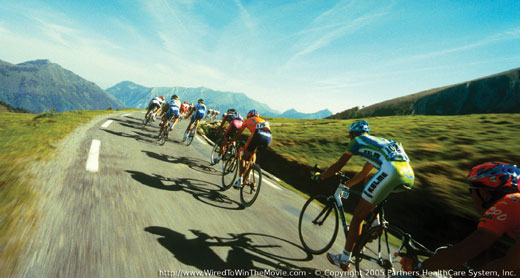 Fall 2007
Fall 2007|
Mind Games
Wired To Win, now playing at Carnegie Science Center’s Rangos Omnimax Theater, shows that it takes plenty of brainpower to put the pedal to the metal and excel during the Tour de France.
Seriously, it’s true. You never forget how to ride a bike. Even after 20 years, most of us can jump into the saddle and pedal away as if we’re 9 years old again. But before you do, strap on an approved helmet. You’ll want to protect the one organ that makes it possible for you to spin those wheels like Lance Armstrong: the brain. Sure, it takes a lot of physical talent and training to compete in an extreme endurance event such as the Tour de France. But as Wired to Win points out, even the world’s best bicyclists rely on a major amount of motivation from their gray matter to push them over the top of the Alps and Pyrenees to cross the finish line on the Champs-Élysées in Paris. “On the surface, Wired to Win is a movie about biking and cyclists,” says Ron Baillie, the Science Center’s chief program director. “But it’s really about the brain and the nervous system, and how they can push their bodies to compete in events like the Tour de France—and how we can all push our bodies beyond their normal limits.” Wired to Win opens with a square-framed, grainy, 1970s 8mm-film format home movie of a youngster learning to ride a bike. Even though he encounters a few scrapes during a crash, the aspiring cyclist jumps back on his wheels again to master the task—which is exactly the point of the film. Following those beginning retro clips, the screen nearly explodes with a breathtaking and almost dizzying view of the world’s best cyclists rolling through the mountains of the French countryside during the 2003 Tour, the event’s 100-year anniversary and the fifth of Armstrong’s seven consecutive victories. Directed by IMAX® veteran Bayley Silleck, Wired focuses on the challenges and hardships of Team FDJeux.com members Baden Cooke and Jimmy Caspar, and how the mental toughness of each man contributed to his eventual completion of the race. Determined to finish his first Tour in three starts, Caspar battled crash injuries that required him to wear a neck brace during the last stage in which he competed. Though he did withdraw, he credited mental toughness for helping him continue racing a day after a nasty pileup immediately sidelined many racers. Meanwhile, Cooke started the Tour with the goal of finishing among the event’s top sprinters. Rushing off to a fast start and actually winning one Tour stage, Cooke struggled to outpace mental and physical fatigue to capture the green jersey as the Tour’s top speedster. Interspersed between race scenes and in-depth looks at the psyches of the featured racers, segments of the film trek deep into the brain to explore which sections of the body command center play a role in helping humans do what seems nearly impossible. Thanks to groundbreaking, anatomically correct computer graphics, the film provides a never-before-seen view of how each section of the brain is wired to win. Through close inspection of that spongy gray matter that perceives and processes every sensation our bodies experience, the brain acts as an alarm system, cheerleader, and advisor to shut out the many distractions that could derail Tour cyclists. Though Lance Armstrong, Tiger Woods, and other top jocks might be more wired to a greater degree than most of us, some experts believe that just about everyone can train to surpass normal expectations. “Whatever the activity, your brain is going to influence what you do,” says Aimee Kimball, Ph.D., director of mental training at the University of Pittsburgh Medical Center’s Center for Sports Medicine. Kimball works with athletes to help them condition their thoughts to excel. “Most people don’t understand how much the mind controls the body,” she continues. “The first step is learning how to focus on the positives instead of the negatives. You have to determine what it is that you want to achieve instead of dwelling on everything that could stand in the way.” Kimball stresses that the mental preparation for an undertaking like the Tour de France starts long before the day of a race. “Sometimes it’s easy to skip a day of training because you’re sore or the weather’s bad,” she adds. “But what happens on the day of a race and it’s raining or you’re not feeling 100 percent? If you’ve dealt with those experiences before an event, then your brain recognizes those situations and can help you overcome them. When push comes to shove, mental toughness can overcome sheer physical talent.” Now, there’s something to wrap your brain around. |
Also in this issue:
Inside Out · 100 Years Ago · Art on a Grand Scale · The Real Deal · Hidden Treasure · Adding More Andy · Giant Steps Toward Building the Future · Director's Note · NewsWorthy · Now Showing · Face Time: Ron Wertz · About Town: Summer Sleuthing · First Person: Tracing the Making of a Collection · Artistic License: Dissecting Art · Another Look: The Warhol's Film & Video Collection · Then & Now: Body Language
 |
Copyright © 2017 CARNEGIE Magazine. All rights reserved. |

